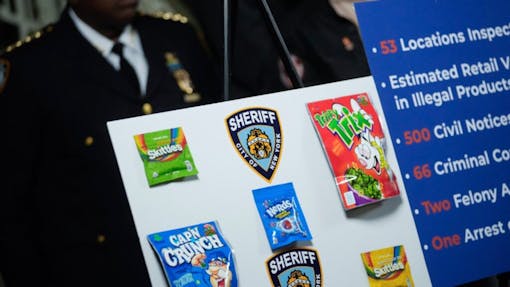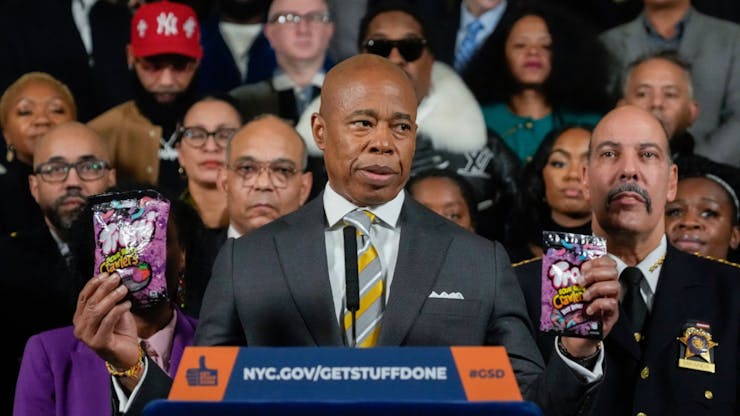The city launched a task force to weed out unlicensed dispensaries. They seized 100,000 products and $4 million in two weeks.
Last Thursday, New York City Mayor Eric Adams announced a new initiative to drive unlicensed marijuana stores out of New York. With New York’s legal cannabis stores expected to open late next week, Adams said a new joint task force will use raids, civil penalties, and summons to push the state’s fake dispensaries out of business–without criminalizing the offenders.
“Unlicensed cannabis stores are threatening a budding economic opportunity for our city,” Mayor Adams said at City Hall on Thursday. The joint task force will include the New York City Sheriff’s Office, the NYPD, the city’s Department of Consumer and Worker Protections, and the New York State Office of Cannabis Management.
Last month, those agencies made their first raids of unlicensed weed stores, including one in Brooklyn. According to the Mayor, they’ve hit 53 stores so far. The Mayor said he is also seeking a partnership with the state to tweak and adjust the current laws that prevent more aggressive enforcement.
“New York City is on a mission to become the number one global hub for cannabis industry excellence, education and equity across business, science and culture,” said NYC Cannabis Czar Dasheeda Dawson. Dawson said that public health, the safety of minors, and the success of the legal market were all driving forces behind the emergency task force.
How did New York’s weed stores get out of control?

After cannabis possession in New York State was legalized for adults in March 2021, many New York City storefronts took advantage by adding pre-rolls and bootleg bags of bud to their inventory. Some even claimed to be legitimate dispensaries, advertising that they were licensed and selling popular legal brands like Cookies and Jungle Boys. A recent study showed that these stores are misleading customers. They are not licensed, and they do not carry regulated and lab-tested products. Many products tested in the study were found to be contaminated with e. coli, salmonella, heavy metals, and other toxins.
Juancarlos Huntt is a legacy operator from Queens who sold weed for 20 years, but is now a proud license applicant, and the co-founder of New York for Social and Economic Equity (NYSEE), which helps entrepreneurs in New York build wealth through ownership. Huntt said these illicit shops are hurting legacy operators like him, who suffered when the plant was not legal, and are finally poised to get ahead in the legal industry.
“They are claiming they’re legacy operators just because they have a deli or a smoke shop. But they’re re-traumatizing our people by poisoning them with the veil of, ‘I’m a legacy operator.’ All the real legacy operators, none of us opened up storefronts because we are trying to go the legal route. And the ones that aren’t trying to go the legal route would never open up a storefront. So this is not [legacy], this is completely outside of the scope.”
Juancarlos Huntt
New York cannabis office Executive Director Chris Alexander said his office has spent most of 2022 focused on creating final regulations and rolling out licenses. Now that the market is laid out, “the state wants to defend it,” Alexander said at the press conference. “We’re gonna continue this aggressive action making sure that we’re seizing products—that is the priority of this task force.”
Legacy operators will give input on fair enforcement

Smoker’s Club co-founder Shiest Bubz was one of the legacy operators present at last week’s press conference. Bubz told Leafly, “I was backing up my legacy.” The Smoker’s Club is pre-licensed, according to Dasheeda Dawson, but the exact plans for its legal operation are not clear yet.
Bubz said on Instagram, “The legacy [community] that was present was there to voice our opinions on how to protect and assist Black and brown people [looking] to succeed in this cannabis industry,” Bubz wrote. “I represent the Black market, and the Legacy to Legal motto… I want my equity, as should you!”
“We can’t talk about enforcement without talking about how we are creating the pathways for people to actually transition into the industry,” added Dawson at the conference. Other legacy advisors on hand included Bishop Mitchell Taylor of Urban Upbound, Naomy Guerrero, and cannabis attorney Jeffrey Hoffman, who represents various New Yorkers who are applying for cannabis licenses.

Mayor Adams said at the press conference: “We have many Black and brown folks that are here to really look at this opportunity. Historically, when you thought about cannabis, you thought about the over-enforcement in these communities.”
But this time around, “It’s not about enforcement,” Mayor Adams said, confirming that arrests and criminal charges will not be part of this task force’s mission. “It’s not about duplicating the heavy-handed approach” of the past. “It’s to make sure these [licensed] businesses are successful,” Mayor Adams said.
Shop highly rated dispensaries near you
Showing you dispensaries nearHow will New York shut down illegal weed stores?
With city council members and industry stakeholders demanding enforcement now, regulators are taking care not to repeat the mistakes of past drug enforcement missions. But the threat of being blocked from future license opportunities hasn’t dissuaded many illicit store owners so far.
“We have some ideas, but we’re also going to reach out to the advocates we have here,” Mayor Adams said when asked how the city plans to crack down on so many stores in such a small period of time. “We have watched how other municipalities have gotten it wrong,” Adams added. “Our goal is to get it right.”
“We have to make sure the industry stays in pace with those who are exploiting the industry to hurt the legal distributors and sellers of cannabis… Let’s make sure we don’t have illegal products get in the way of what we fought for all these years.”
Chris Alexander, Executive Director of NY State’s cannabis office
State OCM officials have said they intend to take a “no handcuffs and no criminal charges” approach to the state’s unlicensed cannabis sellers. Mayor Adams said this spring that summons, fines, and civil penalties were the only enforcement planned for gray and illicit cannabis markets.
Stores violating tobacco and vape regulations do not appear to have the same leeway, as at least one man was arrested at a Brooklyn smoke shop last month, for reportedly selling cannabis and tobacco products without a license.




